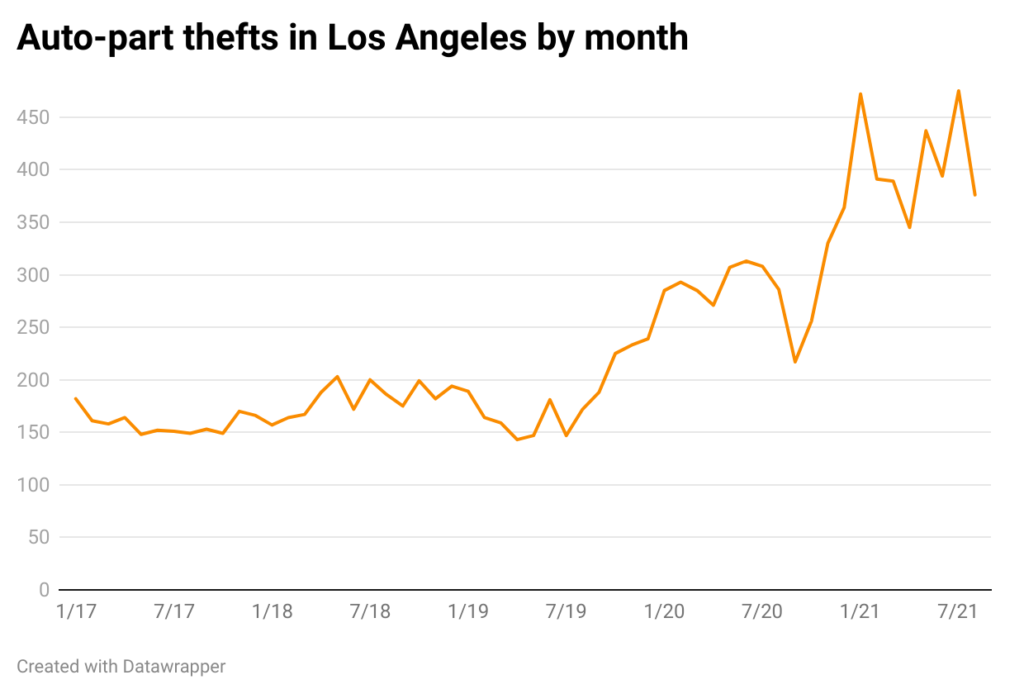Rotten rumble: catalytic converter thefts rise again

This past July, as the Delta variant rampaged across Los Angeles, thieves were doing the same, slicing off a record number of catalytic converters from parked cars.
That month, there were 475 reports of stolen auto parts, the most in any single month since at least 2010, when the Los Angeles Police Department began making its data public. Catalytic converters aren’t the only parts thieves take: Headlamps and airbags also go missing. But the catalytic converters, which can be easily and quickly sold for around $200—although it can cost thousands for car owners to replace them—and melted down for precious metals such as platinum, rhodium and palladium, appear to account for the vast majority of recent thefts.

The rise in auto-part thefts dates back to the latter half of 2019. In July of that year, there were 147 theft reports. Six months later, the number had more than doubled. And when the pandemic hit, and most Angelenos were stuck at home for months on end, the figures soared. One factor: The city suspended many parking regulations during the first months of the lockdown, enticing people to leave their cars parked on the street—and exposed to thieves—for days at a time. January brought 473 reports, just two below the record number in July.
[Get COVID-19, crime and other stats about where you live with the Crosstown Neighborhood Newsletter]
Jo Pann, a resident of the Mid-Wilshire neighborhood, was at home at 7:45 p.m. recently when she heard the sound of a metal cutter outside. She called 911 on her cell phone and went out to the street. At first, she didn’t see anyone. But a moment later, a man emerged from underneath a Toyota Prius. “He looked at me, threw the catalytic converter in his trunk, and took off,” she said. “I didn’t sleep for the next day and a half.” She said she now parks her car in the garage.
In fact, certain Prius models are the most sought after because they contain larger amounts of precious metals. Numerous Prius and other vehicle owners do not discover that their converter has been swiped until they get into their car and turn on the ignition—that is when they hear a loud, throttling sound that has been compared to the roar of a motorcycle.
Law enforcement has been trying to coach people on how to take preventive measures. These include etching the vehicle’s identification number on the catalytic converter so that if it is ever recovered, police can return it. Auto repair shops will also bolt a metal screen on a vehicle’s undercarriage to make it harder for thieves.
But thieves can simply move on to the next car. Part of what is driving the increase is the run-up in prices for palladium and the other metals. In May, trading in palladium hit an all-time high of $3,005 an ounce, according to precious metals trading firm APMEX. The price has since fallen to around $1,900 an ounce. Those prices have turned the trade in stolen catalytic converters into a global problem, with numbers rising in the United Kingdom and elsewhere.
In June, police in Torrance arrested 20 people suspected of stealing catalytic converters. In March, sheriff’s deputies in Santa Clarita recovered around 250 catalytic converters worth an estimated $750,000.
How we did it: We examined publicly available LAPD data on reported crimes in the city of Los Angeles and reported crimes from the Los Angeles Sheriff’s Department. LAPD data only reflects crimes that are reported to the department, not how many crimes actually occurred. In making our calculations, we rely on the data the LAPD makes publicly available.
The LAPD periodically updates past crime reports with new information, leading the department to recategorize past reports. Additionally, revised reports do not always automatically become part of the public database.
Want to know how your neighborhood fares? Or simply just interested in our data? Email us at askus@xtown.la.






